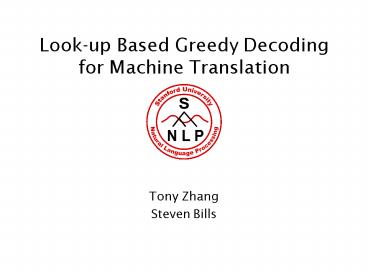Lookup Based Greedy Decoding for Machine Translation - PowerPoint PPT Presentation
Title:
Lookup Based Greedy Decoding for Machine Translation
Description:
IBM Models 1 and 2 generate translation probabilities statistically using parallel text ... mutations to the French translation until no superior mutations are ... – PowerPoint PPT presentation
Number of Views:71
Avg rating:3.0/5.0
Title: Lookup Based Greedy Decoding for Machine Translation
1
Look-up Based Greedy Decoding for Machine
Translation
- Tony Zhang
- Steven Bills
2
Dictionary-based look-up
- IBM Models 1 and 2 generate translation
probabilities statistically using parallel text - We generate probabilities by looking up
translations in freely available online lexical
resources Wikipedia and Wiktionary - These probabilities are often significantly more
accurate than those generated by the IBM models
3
The translation process
- Our system translates from English to French
- We apply chunking, reordering and stemming in a
pre-processing phase - We generate an initial gloss of the pre-processed
English sentence by using the most likely
translation of each word - We greedily apply mutations to the French
translation until no superior mutations are left - We apply post-processing to the resulting
translation to remove duplicate words and perform
contractions
4
Example mutations
- the last election
- Initial gloss le élection durer (the election
to last) - Retranslation mutation le élection dernier
(correct) - parliament is
- Initial gloss parlement est (needs an
article) - Insertion mutation le parlement est (correct
article) - the speaker wants to try
- Initial gloss le président veut à essayer
- Deletion mutation le président veut essayer
5
Processing
- Chunking
- Translate expressions as a whole rather than
word-by-word when they have entries in our
dictionary - someone else ? quelquun dautre
- Reordering
- Swap nouns and adjectives
- useful organization ? organisation utile
- Conjugation
- Conjugate infinitives to agree with the subject
- the men walk ? les hommes marcher
(infinitive) - marcher ? marchent (3rd person plural
conjugation)
6
Results
- Demonstrated the feasibility of building
translation probabilities from online lexical
resources - Mutations and pre- and post-processing fixed many
of the problems associated with word-by-word
replacement - Intelligibility and semantic closeness of
translations drastically improved over IBM Models
1 and 2































